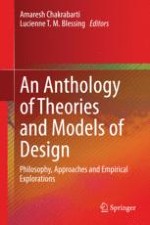2014 | OriginalPaper | Buchkapitel
20. Theories, Models, Programs, and Tools of Design: Views from Artificial Intelligence, Cognitive Science, and Human-Centered Computing
verfasst von : Ashok K. Goel, Michael E. Helms
Erschienen in: An Anthology of Theories and Models of Design
Verlag: Springer London
Aktivieren Sie unsere intelligente Suche, um passende Fachinhalte oder Patente zu finden.
Wählen Sie Textabschnitte aus um mit Künstlicher Intelligenz passenden Patente zu finden. powered by
Markieren Sie Textabschnitte, um KI-gestützt weitere passende Inhalte zu finden. powered by
